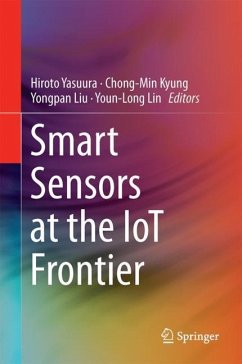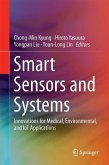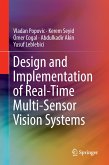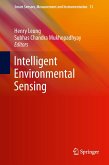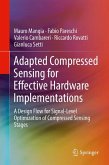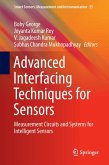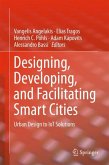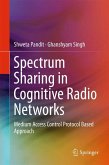Smart Sensors at the IoT Frontier
Herausgegeben:Yasuura, Hiroto; Kyung, Chong-Min; Liu, Yongpan; Lin, Youn-Long
Smart Sensors at the IoT Frontier
Herausgegeben:Yasuura, Hiroto; Kyung, Chong-Min; Liu, Yongpan; Lin, Youn-Long
- Gebundenes Buch
- Merkliste
- Auf die Merkliste
- Bewerten Bewerten
- Teilen
- Produkt teilen
- Produkterinnerung
- Produkterinnerung
This book describes technology used for effective sensing of our physical world and intelligent processing techniques for sensed information, which are essential to the success of Internet of Things (IoT). The authors provide a multidisciplinary view of sensor technology from materials, process, circuits, to big data domains and they showcase smart sensor systems in real applications including smart home, transportation, medical, environmental, agricultural, etc. Unlike earlier books on sensors, this book provides a "global" view on smart sensors covering abstraction levels from device, circuit, systems, and algorithms. …mehr
Andere Kunden interessierten sich auch für
![Smart Sensors and Systems Smart Sensors and Systems]() Smart Sensors and Systems131,99 €
Smart Sensors and Systems131,99 €![Design and Implementation of Real-Time Multi-Sensor Vision Systems Design and Implementation of Real-Time Multi-Sensor Vision Systems]() Vladan PopovicDesign and Implementation of Real-Time Multi-Sensor Vision Systems100,99 €
Vladan PopovicDesign and Implementation of Real-Time Multi-Sensor Vision Systems100,99 €![Intelligent Environmental Sensing Intelligent Environmental Sensing]() Intelligent Environmental Sensing77,99 €
Intelligent Environmental Sensing77,99 €![Adapted Compressed Sensing for Effective Hardware Implementations Adapted Compressed Sensing for Effective Hardware Implementations]() Mauro MangiaAdapted Compressed Sensing for Effective Hardware Implementations77,99 €
Mauro MangiaAdapted Compressed Sensing for Effective Hardware Implementations77,99 €![Advanced Interfacing Techniques for Sensors Advanced Interfacing Techniques for Sensors]() Advanced Interfacing Techniques for Sensors123,99 €
Advanced Interfacing Techniques for Sensors123,99 €![Designing, Developing, and Facilitating Smart Cities Designing, Developing, and Facilitating Smart Cities]() Designing, Developing, and Facilitating Smart Cities77,99 €
Designing, Developing, and Facilitating Smart Cities77,99 €![Spectrum Sharing in Cognitive Radio Networks Spectrum Sharing in Cognitive Radio Networks]() Shweta PanditSpectrum Sharing in Cognitive Radio Networks77,99 €
Shweta PanditSpectrum Sharing in Cognitive Radio Networks77,99 €-
-
-
This book describes technology used for effective sensing of our physical world and intelligent processing techniques for sensed information, which are essential to the success of Internet of Things (IoT). The authors provide a multidisciplinary view of sensor technology from materials, process, circuits, to big data domains and they showcase smart sensor systems in real applications including smart home, transportation, medical, environmental, agricultural, etc. Unlike earlier books on sensors, this book provides a "global" view on smart sensors covering abstraction levels from device, circuit, systems, and algorithms.
Produktdetails
- Produktdetails
- Verlag: Springer / Springer International Publishing / Springer, Berlin
- Artikelnr. des Verlages: 978-3-319-55344-3
- 1st edition 2018
- Seitenzahl: 384
- Erscheinungstermin: 8. Juni 2017
- Englisch
- Abmessung: 241mm x 160mm x 27mm
- Gewicht: 736g
- ISBN-13: 9783319553443
- ISBN-10: 3319553445
- Artikelnr.: 47570631
- Herstellerkennzeichnung Die Herstellerinformationen sind derzeit nicht verfügbar.
- Verlag: Springer / Springer International Publishing / Springer, Berlin
- Artikelnr. des Verlages: 978-3-319-55344-3
- 1st edition 2018
- Seitenzahl: 384
- Erscheinungstermin: 8. Juni 2017
- Englisch
- Abmessung: 241mm x 160mm x 27mm
- Gewicht: 736g
- ISBN-13: 9783319553443
- ISBN-10: 3319553445
- Artikelnr.: 47570631
- Herstellerkennzeichnung Die Herstellerinformationen sind derzeit nicht verfügbar.
Hiroto Yasuura is the Director of the System LSI Research Center and Professor in the Graduate School of Information Science, at Kyushu University, in Fukuoka, Japan. Chong-Min Kyung received B.S. in EE from Seoul National University in 1975, M.S. and Ph.D. in EE from KAIST in 1977 and 1981, respectively. From 1981 to 1983, he worked at Bell Telephone Laboratories, Murray Hill. Since he joined KAIST in 1983, he has been working on CAD algorithms, 3-D graphics, and System-on-a-Chip design and verification methodology, development of various RISC/CISC microprocessors, VLIW and reconfigurable DSP cores. His current research includes system-level low-power design, electrical/thermal co-design in 3D IC, architectures of H.264 video CODEC and energy-rate-distortion-power optimization. He served as General Chair in the Korean Semiconductor Conference 2002, ISOCC 2004, A-SSCC 2007, and ASP_DAC 2008. He is founding Director of the IDEC(Integrated Circuit Design Education Center), andcurrently leads Center for Integrated Smart Sensors, funded as Global Frontier Project by Korean Government. He received the Most Excellent Design Award, and Special Feature Award in the University Design Contest in the ASP-DAC 1997 and 1998, respectively. He received the Best Paper Awards in the 36th DAC held in New Orleans, LA, the 10th ICSPAT, Orlando, FL, in September 1999, and the 1999 ICCD Austin, TX. In 2000, he received National Medal from Korean government for his contribution to research and education in IC design. He is a member of National Academy of Engineering Korea, and Korean Academy of Science and Technology. He is IEEE fellow and Hynix Chair Professor at KAIST. Yongpan Liu received his B.S., M.S. and Ph.D. degrees from Electronic Engineering Department, Tsinghua University in 1999, 2002, and 2007. He worked as a Research Assistant in Circuit and System Divisions in Tsinghua University from 2002 to 2004. (Referred to CV) His mainresearch interests include: Embedded System, Nonvolatile Computing, Electronics Design Automation and Power/Thermal Aware VLSI Design and Test. Our group currently focuses on High Performance Low Power circuit device, chip architecture and system design methodology on next generation computing applications. Youn-Long Lin is a Tsing Hua Chair Professor of Computer Science of the National Tsing Hua University. He was born in Yun-Lin, Taiwan. He received his B.S. degree in electronics engineering from National Taiwan University of Science and Technology (formerly, National Taiwan Institute of Technology), Taipei, Taiwan, in 1982, and his Ph.D. in computer science from the University of Illinois, Urbana-Champaign, IL, U.S.A. in 1987. Upon his graduation, he joined National Tsing Hua University, Hsin-Chu, Taiwan, where he established the THEDA Group (Tsing Hua EDA), served as Director of the University Computer and Communication Center, Chairman of the Department of Computer Science, Secretariat General of the University, Chief Librarian of the University Library, and the Dean of Research & Development. He is also an adjunct professor of Peking University, Beijing and a guest professor of Waseda University, Japan.
Smart Sensors at the IoT Frontier - Introduction.- Part I: Device technology for IoT.- Chapter1. Energy-Autonomous Supply-Sensing Biosensor Platform Using CMOS Electronics and Biofuel Cells.- Chapter2. Smart Microfluidic Biochips.- Chapter3. Reducing Timing Discrepancy for Energy-Efficient On-Chip Memory Architectures at Low-Voltage Mode.- Chapter4. Redesigning Software and Systems for Non-volatile Processors on Self-powered Devices.- Part II: Sensing technology for IoT.- Chapter5. OEICs for High Speed Data Links and Tympanic Membrane Transducer of Hearing-Aid Device.- Chapter6. Depth estimation using single camera with dual apertures.- Chapter7. Scintillator-based Electronic Personal Dosimeter for Mobile Application.- Part III System and application.- Chapter8. LED Spectrophotometry and Its Performance Enhancement based on Pseudo BJT.- Chapter9. An air quality and event detection system with life logging for monitoring household environments.- Chapter10. Mobile Crowdsensing to Collect Road Conditions and Events.- Chapter11. Sensing and Visualization in Agriculture with Affordable Smart Devices.- Chapter12. Learning Analytics for e-Book-Based Educational Big Data in Higher Education.- Chapter13. Security and Privacy in IoT Era.
Smart Sensors at the IoT Frontier - Introduction.- Part I: Device technology for IoT.- Chapter1. Energy-Autonomous Supply-Sensing Biosensor Platform Using CMOS Electronics and Biofuel Cells.- Chapter2. Smart Microfluidic Biochips.- Chapter3. Reducing Timing Discrepancy for Energy-Efficient On-Chip Memory Architectures at Low-Voltage Mode.- Chapter4. Redesigning Software and Systems for Non-volatile Processors on Self-powered Devices.- Part II: Sensing technology for IoT.- Chapter5. OEICs for High Speed Data Links and Tympanic Membrane Transducer of Hearing-Aid Device.- Chapter6. Depth estimation using single camera with dual apertures.- Chapter7. Scintillator-based Electronic Personal Dosimeter for Mobile Application.- Part III System and application.- Chapter8. LED Spectrophotometry and Its Performance Enhancement based on Pseudo BJT.- Chapter9. An air quality and event detection system with life logging for monitoring household environments.- Chapter10. Mobile Crowdsensing to Collect Road Conditions and Events.- Chapter11. Sensing and Visualization in Agriculture with Affordable Smart Devices.- Chapter12. Learning Analytics for e-Book-Based Educational Big Data in Higher Education.- Chapter13. Security and Privacy in IoT Era.

